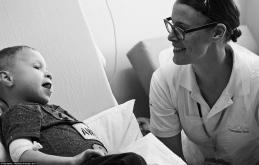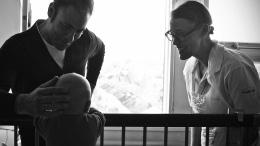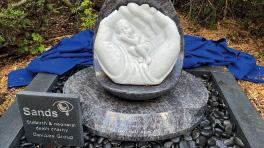
6 minute read
Full Circle
Suzanne Ruggles speaks about the founding of Full Circle Fund Therapies.
Why did you decide to set up your charity?
Advertisement
In the 1990s I had a successful London based design business, my clients included royalty, ambassadors, and Hollywood actors. However, in 1996 I was diagnosed with Lupus (SLE), an incurable, potentially fatal autoimmune illness. My consultant informed me that the cause was not known but he said unequivocally, it was certainly exacerbated by stress. He added, 75% of illnesses are stress-related and urged me to find a way to control my stress. I asked him for guidance on where to go or who to contact but he replied: ‘I have no idea’. I had no idea either at that time. I had no skill set for managing my stress or my now deadly diagnosis.
Stress or its impact on my health had never been on my radar before. Realizing that if I didn’t have my health, I didn’t have all of my life. I made the decision to concentrate on what my doctor had told me and started from scratch to learn what I needed to manage my stress levels in the hope that I could find a way to co-exist – at least - with this illness. I researched, explored, and received a few therapies. My blood tests began to show what I already had begun to feel within myself; my symptoms were easing and concurrently, I felt more peaceful and more in control.
This new state of wellbeing led me to a fascination in the mind-body connection, and in due course to study Health Psychology. My newfound interest in the science of relaxation and positive psychology led me to undertake two trips to Harvard Medical School to hear firsthand the research work of Dr Herbert Benson MD and his team. This was where I first came across the science of the Relaxation Response and research into the beneficial effects in the brain after meditation and Mindfulness. Eventually I received a Master’s in Health Science from St George’s Medical School, University of London.
About Full Circle
In 2001, I set up my first project for St George’s University Hospital, London – one of Europe’s largest hospitals. The project was the first of its kind in the UK and was focused on the haematology unit. The aim was to support blood cancer and transplant patients who endure months in isolation rooms undergoing intensive chemotherapy. I could see also at that time that there were many other brave patients who didn’t have a cancer diagnosis but who had equally devastating diagnoses, but who did not have access to this project (as it was, at the time funded only for cancer patients). I knew the importance of this work and that it should not focus on one illness or just one patient group, instead, I have always believed it needs to be accessible equitably in the NHS and crucially at the point of most need – wherever that need is. It didn’t take long for our project to expand to oncology, paediatric medicine (including a pioneering project for ex-premature babies who have had multiple surgeries) as well as paediatric and adult intensive care and neuro rehabilitation.
We specialise in funding highly skilled integrated medicine practitioners who, prior to Covid-19 provided around 2000 free treatments a year to extremely sick children and adults. At the start of Covid-19, we took our know-how online, partnered with global experts in resilience, mindfulness and nutrition so that we could continue to support hospitalized and shielded patients and their carers and of course to support NHS staff during the crisis too. Our Wellbeing Hub has to date, supported over 10,000 people in its first year.
At the heart of what we do is to acknowledge the ‘whole person’ at the centre of medical treatment. In the Full Circle approach, we are not looking at a patient with a collection of clinical tests for a life-threatening diagnosis. We see the whole person and work from there to support their mind and body with the aim of strengthening their resilience to endure the many rigors that may lie ahead. The more intensive the treatment or more life threatening the diagnosis, the more important this aspect of our work is.
We believe it is essential – to keep a patient feeling human. We work closely alongside our many medical and nursing colleagues who share our ethos and it is they who call for Full Circle to be present in the care of their very sick patients.
We offer a choice of evidence-based and evaluated mindbody interventions which include clinical massage, reflexology, reiki, mindfulness, Relaxation Response breathing techniques, clinical hypnotherapy and visualization. Our role is to help that person reconnect to where they can experience a sense of stillness and then to locate within themselves an often profound and enduring sense of calm. To a frightened, embattled spirit, already coping with the uncertainty of a life challenging illness, as well as enduring pain and complex side effects, these moments of deep calm can be transformational. We call this state ‘remembered wellness’ and we witness the impact of this on our patients’ lives daily.
Full Circle has something special about it; it seems to attract just the right people at just the right time. Even in times of great challenge we find a way. This is why we were so thrilled to receive the support of the ICCM and to receive your immensely generous donation of £10,000. Your support came just at the most critical time as we begin to bring our team back, safely, onto the wards. Receiving your donation has allowed us to plan for this and imminently we will be restarting our Covid-era service on the paediatric wards with a specific focus on teenagers with life-limiting eating disorders, children with Sickle Cell Disease and those coping with trauma and recovering from neurosurgery.
Wellbeing focus in hospitals is not just for patients (although that is so vital) but it is urgently needed for NHS staff too. Our expertise in wellbeing has never been more needed. Before Covid we have always believed NHS staff wellbeing is central to the care of very sick patients, and have found ways to support them but it is even more vital now because of the pandemic and we are determined to reach as many NHS Trusts as we can to offer them our support at this critical time in the NHS.
We are uniquely positioned and have the know-how to bring the right expert people who, with us, share the same values and ethos that whole person support for the most sick in our hospitals and for those who are caring for them. This whole person care is undoubtedly one of the most essential aspects needed in today’s healthcare. This is why we are so incredibly grateful to the ICCM for your generosity which enables us to continue to plan for, and deliver, the sort of care that makes life worthwhile for those who need it most.
About the Founder.
Suzanne Ruggles was a celebrated designer before a diagnosis of Lupus (SLE) changed her life’s direction. Her experience led her to study the science of mind-body medicine in the UK and US and led her to establish an award-winning hospital project at St George’s Hospital, London. Six years later in a near-death experience caused by bacterial meningitis, she understood firsthand the importance of caring holistically for the most vulnerable patients, and why this is needed in modern healthcare. Suzanne is an author and lectures widely in schools, universities, conferences and has presented her work to the All Party Parliamentary Group for Integrated Medicine.
Suzanne’s memoir Coming Full Circle: A Journey to the Edge and Back (2019, Balboa Press, part of Hay House), is available on Amazon and all good bookstores.
Suzanne Ruggles Founder and CEO of Full Circle Fund Therapies










